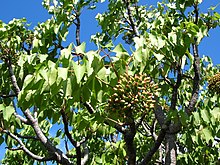Polyscias sandwicensis
Appearance
| Polyscias sandwicensis | |
|---|---|

| |
| Scientific classification | |
| Kingdom: | Plantae |
| Clade: | Tracheophytes |
| Clade: | Angiosperms |
| Clade: | Eudicots |
| Clade: | Asterids |
| Order: | Apiales |
| Family: | Araliaceae |
| Genus: | Polyscias |
| Species: | P. sandwicensis
|
| Binomial name | |
| Polyscias sandwicensis (A.Gray) Lowry & G.M.Plunkett
| |
| Synonyms[2] | |
|
Reynoldsia sandwicensis A.Gray | |
Polyscias sandwicensis, known as the 'ohe makai[3] or ʻOhe kukuluāeʻo in Hawaiian, is a species of flowering plant in the family Araliaceae, that is endemic to Hawaii. It is a tree, reaching a height of 4.6–15 m (15–49 ft) high with a trunk diameter of 0.5–0.6 m (1.6–2.0 ft).[4] It can be found at elevations of 30–800 m (98–2,625 ft) on most main islands. Polyscias sandwicensis generally inhabits lowland dry forests, but is occasionally seen in coastal mesic and mixed mesic forests.[5] It is threatened by habitat loss.
References
[edit]- ^ World Conservation Monitoring Centre (1998). "Polyscias sandwicensis". IUCN Red List of Threatened Species. 1998: e.T33683A9796374. doi:10.2305/IUCN.UK.1998.RLTS.T33683A9796374.en. Retrieved 16 November 2021.
- ^ "Polyscias sandwicensis (A.Gray) Lowry & G.M.Plunkett". World Checklist of Selected Plant Families. Royal Botanic Gardens, Kew. Retrieved 31 March 2014 – via The Plant List. Note that this website has been superseded by World Flora Online
- ^ NRCS. "Reynoldsia sandwicensis". PLANTS Database. United States Department of Agriculture (USDA). Retrieved 20 October 2015.
- ^ Little Jr., Elbert L.; Roger G. Skolmen (1989). "ʻOhe makai, Hawaiian reynoldsia" (PDF). Common Forest Trees of Hawaii. United States Forest Service. Archived from the original (PDF) on 2009-09-18. Retrieved 2009-11-23.
- ^ "ohe makai". Hawaii Ethnobotany Online Database. Bernice P. Bishop Museum. Archived from the original on 2007-07-02. Retrieved 2009-11-23.
External links
[edit]![]() Media related to Polyscias sandwicensis at Wikimedia Commons
Media related to Polyscias sandwicensis at Wikimedia Commons
- "Reynoldsia sandwicensis". Hawaiian Native Plant Propagation Database. University of Hawaiʻi at Mānoa.

